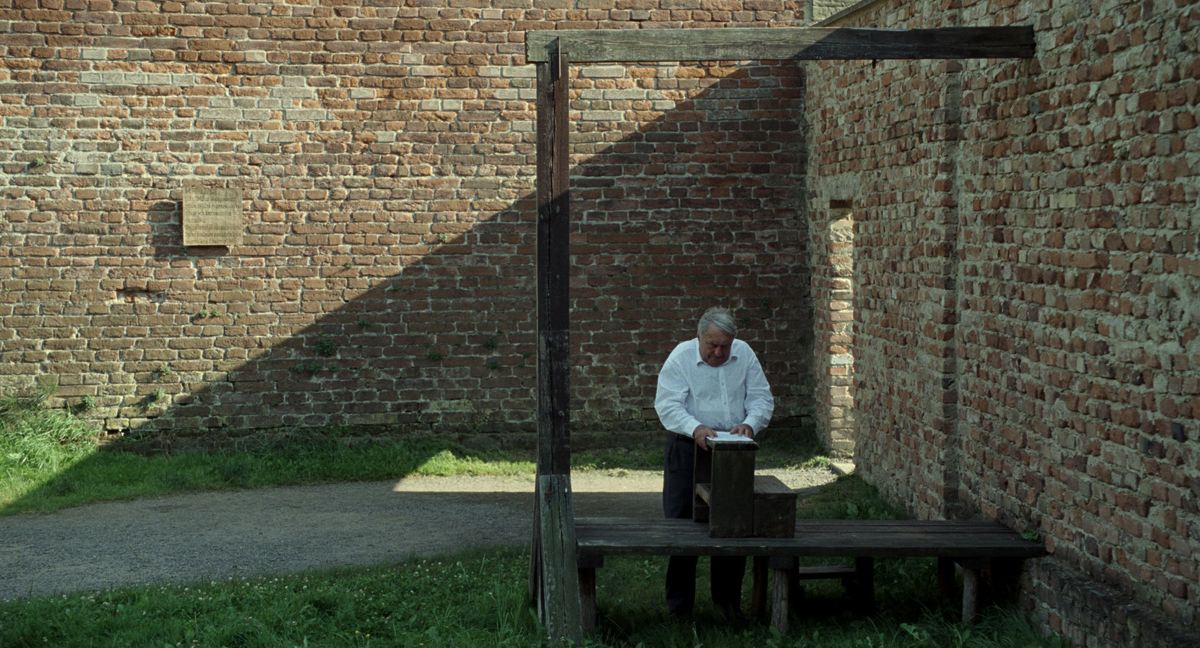By Chlotrudis Independent Film Society
Rating: 5 cats
Director: Claude Lanzmann

Original language title: Le dernier des injustes
Country: austria, france
Year: 2014
Running time: 220
IMDB: http://www.imdb.com/title/tt2340784/combined
Kyle says: “AT BERKELEY and THE LAST OF THE UNJUST share little in common aside from both being Main Slate screenings of the 51st New York Film Festival, both having very long running times, and both being sharply revealing contemporary documentaries of the highest caliber, directed by legendary creators well into their eighties. The former is an incisive portrait of America’s higher educational system at one of our finest public universities, University of California/Berkeley, the latter a devastating portrait of men doing their worst, and occasionally their best, during the cruelest years of the twentieth century, World War II in Germany.
“THE LAST OF THE UNJUST has been assembled by director Claude Lanzmann from the massive quantities of film he shot for his masterpiece on the Holocaust SHOAH (1985), and marks the fourth feature that he has created from unused footage, the others being A VISITOR FROM THE LIVING (1997), SOBIBOR, 14 OCTOBER 1943, 4 P.M. (2001), and THE KARSKI REPORT (2010). As witnesses to the horrors of the Holocaust increasingly die off, our gratitude to Lanzmann for having shot so much footage correspondingly increases. THE LAST OF THE UNJUST chronicles the memories of Rabbi Benjamin Murmelstein in interviews conducted by Lanzmann in Rome. Murmelstein bore the nightmarish distinction of being the last Elder of the Jewish Council (Judenältesten) governing the Theresienstadt ghetto, the ‘model’ concentration camp whose true mission was concealed during well-known 1944 film footage of the inmates engaged in various activities, their dead eyes failing to fool modern viewers alert to the shocking sham.
“Rabbi Murmelstein is a figure of great controversy, charged both officially and in memory with Nazi collaboration, and shunned for the fact of his survival, living out his life in a sort of exile in Rome. In Lanzmann’s interviews he appears sometimes manipulative, occasionally unctuous, and even untrustworthy, when he claims unconvincingly he had no knowledge of what was happening to the Jews in Eastern Europe, except for an occasional ‘rumor.’ But his tale of survival at Theresienstadt is transfixing, as he explains how he managed to stay alive, while one of his predecessors Jacob Edelstein was forced to watch the execution of his wife and son before he was himself executed. (One wonders if this particularly horrific bit of Nazi brutality was learned from executions during the French Revolution.) Since Theresienstadt was a place of lies, a place where these lies had infinitely more value than truth, Murmelstein explains how he learned to lie in order to live. A typhus epidemic should be eradicated not with treatment but by killing off anybody with typhus; the Rabbi manipulates events so that does not happen. Murmelstein’s craftiest comparison is that he played the role of a Scheherazade who delayed death by telling a story that never reaches its end. He says: ‘I did things that others didn’t do.’ Ultimately Murmelstein survived in part due to chance, but also because the Nazis needed him — to manage the ghetto, the gas chambers, Jewish burials, and the Red Cross.
“Murmelstein’s most explosive tales are of Adolph Eichmann, about whom we may now retire the notion he maintained during his 1961 trial of being a mere functionary who only followed orders. Murmelstein describes Kristallnacht, the orgy of violence against Jewish businesses and synagogues the night of November 9 to 10, 1938, highlighting his eyewitness account of Eichmann with a crowbar maniacally smashing sacred Jewish artifacts alongside members of the SA and various Nazi sympathizers. Most amazing of all, there is an anecdote about Eichmann visiting Theresienstadt and summoning Murmelstein for a meeting. With Murmelstein standing and Eichmann seated, he realized he would have to look up at the Jewish Elder to converse, which was unthinkable; so he called for the loathsome Karl Rahm (final Commandant of the camp, captured, tried and executed on April 30, 1947, for crimes against humanity) to bring a chair for Murmelstein to sit in — a humiliation that haunted the Camp Commandant thereafter as he supervised deportations, tortures and executions during the War’s final months. Murmelstein: ‘Everything was a lie. And we had to live that lie for the world.’ Lanzmann: ‘Theresienstadt was human in appearance only. It was the worst kind of concentration camp, with blackmail, lies, and naked violence.’ 5 cats
“Sunday, September 29, 2013, New York Film Festival at Alice Tully Hall, Lincoln Center, New York.”
